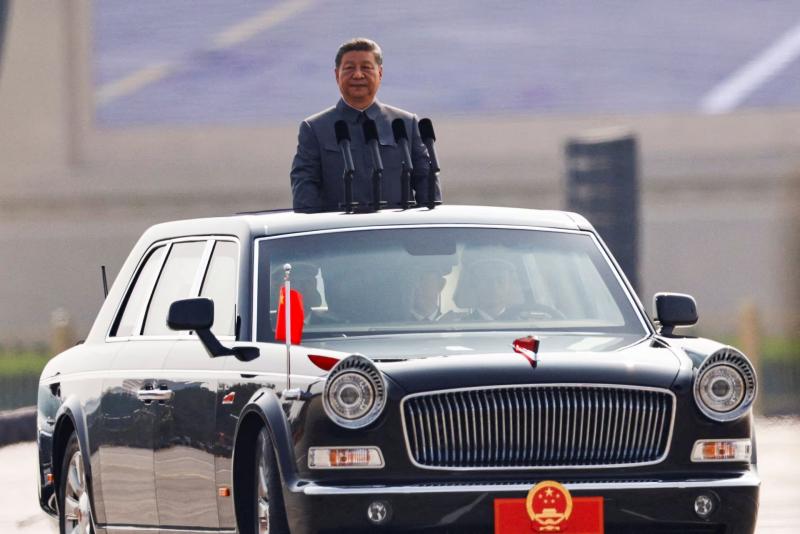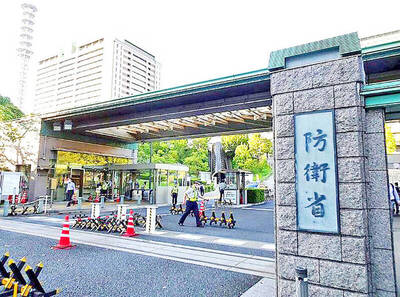President William Lai (賴清德) criticized strongmen personality cults and secret police networks today, as Chinese President Xi Jinping (習近平) hosted the leaders of Russia and North Korea at a military parade marking the end of World War II.
Taiwan has repeatedly lambasted China for what Taipei sees as a distorted view of the war, as the Republic of China was the government at the time, fighting alongside the Allies.
Writing on Facebook to mark Armed Forces Day in Taiwan, Lai said republican general Hsu Yung-chang (徐永昌) signed the Japan surrender on behalf of China, calling it "gratifying" that the former Axis powers had all become democracies since.

Photo: Reuters
"The definition of fascism is broad," Lai wrote.
"It encompasses extreme nationalism, the pursuit of illusory great nation rejuvenation, intense domestic speech control, suppression of social diversity, establishment of secret police networks and overt cults of personality around strongman leaders," he wrote.
Lai did not directly mention China's war parade, at which Xi, flanked by Russian President Vladimir Putin and North Korean leader Kim Jong-un, warned the world was facing a choice between peace and war.
Some Taiwanese television stations showed the event, but it did not get the same wall-to-wall coverage as in China.
"I think that the three of them joining together is meant to show they might be willing to use force to invade Taiwan and threaten Western countries," Taipei restaurant owner Chen Ho-chien, 29, said, referring to Xi, Putin and Kim.
During China's parade, Lai attended a memorial ceremony at Taipei's National Revolutionary Martyrs' Shrine to commemorate those who died fighting for the Republic of China, including those who battled Japan and the communists.
Taiwan told its people not to attend Beijing's parade.
The most high-profile attendee from Taiwan was former Chinese Nationalist Party (KMT) chairwoman Hung Hsiu-chu (洪秀柱).
The KMT was the Republic of China's ruling party during the war against Japan. It fled, along with the republican government, to Taiwan in 1949.
The KMT did not send any official delegation to Beijing's parade.
In Beijing, Xi warned that the world was facing a choice between peace or war as he held his country's largest-ever military parade.
"Today, mankind is faced with the choice of peace or war, dialogue or confrontation, win-win or zero-sum," Xi told a crowd of more than 50,000 spectators at Tiananmen Square, adding that the Chinese people "firmly stand on the right side of history."
Riding in an open-top limousine, Xi then inspected the troops and cutting-edge military equipment such as missiles, tanks and drones on display.
Helicopters trailing large banners and fighter jets flew in formation above during the 70-minute showcase thick with symbolism and propaganda, which culminated in the release of 80,000 peace doves and colorful balloons.
Wearing a suit in the style of those worn by former Chinese leader Mao Zedong (馬澤東), Xi earlier greeted more than 20 leaders on the red carpet including Indonesian President Prabowo Subianto, who made a surprise appearance despite widespread protests at home.

LOOKING NORTH: The base would enhance the military’s awareness of activities in the Bashi Channel, which China Coast Guard ships have been frequenting, an expert said The Philippine Navy on Thursday last week inaugurated a forward operating base in the country’s northern most province of Batanes, which at 185km from Taiwan would be strategically important in a military conflict in the Taiwan Strait. The Philippine Daily Inquirer quoted Northern Luzon Command Commander Lieutenant General Fernyl Buca as saying that the base in Mahatao would bolster the country’s northern defenses and response capabilities. The base is also a response to the “irregular presence this month of armed” of China Coast Guard vessels frequenting the Bashi Channel in the Luzon Strait just south of Taiwan, the paper reported, citing a

A total lunar eclipse, an astronomical event often referred to as a “blood moon,” would be visible to sky watchers in Taiwan starting just before midnight on Sunday night, the Taipei Astronomical Museum said. The phenomenon is also called “blood moon” due to the reddish-orange hue it takes on as the Earth passes directly between the sun and the moon, completely blocking direct sunlight from reaching the lunar surface. The only light is refracted by the Earth’s atmosphere, and its red wavelengths are bent toward the moon, illuminating it in a dramatic crimson light. Describing the event as the most important astronomical phenomenon

The presence of Taiwanese politicians at China’s military parade tomorrow would send the wrong message to Beijing and the international community about Taiwan’s sovereignty and democracy, a national security official said yesterday. China is to hold the parade tomorrow to mark the 80th anniversary of Japan’s surrender in World War II. By bringing together leaders of “anti-West” governments such as Russia, North Korea, Iran and Belarus, the parade aims to project a symbolic image of an alliance that is cohesive and unbending against Western countries, the national security official said, speaking on condition of anonymity. Former Chinese Nationalist Party (KMT) chairwoman Hung Hsiu-chu

ENHANCING DETERRENCE: Stationing the missiles in Kyushu would allow Japan to cover waters near Taiwan and China’s coastal areas without any logistical difficulties Japan is to deploy extended-range anti-ship missiles at a Ground Self-Defense Force base in Kumamoto to bolster its defenses, the Yomiuri Shimbun reported on Saturday. The upgraded Type 12 surface-to-ship missile, with a range of more than 1,000km, would be capable of striking targets in the Taiwan Strait and along China’s coast. Originally limited to a few hundred kilometers, the Type 12 was recently modernized ahead of schedule. Deployment, initially slated for next year, has been accelerated after the upgrade was completed sooner than expected, the newspaper said. Stationing the missiles in Kyushu would allow Japan to cover waters near Taiwan and